Getting Into: W.A.S.P.

| Written by: | ScreamingSteelUS |
| Published: | June 19, 2015 |
The articles in this series begun by our own Baz Anderson are designed to give a brief overview of a band's entire discography, so as to provide a clear point of entry for the uninitiated. It offers a different approach from the typical review format, for the curious newcomer to a well-traveled band.
W.A.S.P.
Heavy metal, glam metal, hard rock, industrial metal
USA
W.A.S.P. emerged from the same place at the same time as many of the hair metal "greats" and populated the same scene for the first few years of their existence, but they always possessed a special something that set them apart - and that would eventually mutate into dramatic changes. After three albums, founder/vocalist/guitarist Blackie Lawless took a sharp left turn into undiscovered country and proved himself a mature, adept songwriter over a series of increasingly-grim releases. Though W.A.S.P. are still defined to many people by those early albums (a fate that befalls so many artists), they have journeyed repeatedly to greater heights and more interesting musical climes - not always successfully, but leaving behind enough inspired work to make them more of a heavy metal institution than a footnote in the records of pop-metal's decrepit heyday.
--
      | W.A.S.P. (1984) Consistently counted among their best releases, W.A.S.P.'s self-titled debut burns with the confidence of a band that has already made it and the fury of a band that still has something to prove. Naysayers need look no further than the first songs to realize how erroneous the "hair metal" label can be for W.A.S.P.; they may have come from Los Angeles, but no ordinary L.A. glam band played songs as wicked, dark, and dangerous as "Hellion" or "Tormentor." The album does suffer from a few loose throwaway tracks in that breezy, braindead style, but for the most part, this debut sets W.A.S.P. apart from their compatriots, from the "Love Gun"-inspired "L.O.V.E. Machine" to the delighted odes to torture. What's more, the highly controversial single "Animal (Fuck Like A Beast)," the song that more than any other kicked off the PMRC-spearheaded censorship crisis of the mid-'80s, appears on the reissue. Standout Tracks: "I Wanna Be Somebody," "L.O.V.E. Machine," "Hellion," "Sleeping (In The Fire)" |
| The Last Command (1985) Riding high on the hit singles "Wild Child" and "Blind In Texas," Blackie Lawless and co. released their sophomore album to massive acclaim. While generally acknowledged in the same favorable light as the debut, The Last Command's zealously simple hooks fall more in line with the coiffured legions of the glammed. The filler is both less compelling and more plentiful, and the songwriting generally more mundane. Whereas W.A.S.P. had one foot in L.A. and one foot in hell (and there is a difference, apparently), The Last Command spends most of its time punching power chords aimlessly; but this does not preclude it from producing its fair share of boisterous mirth, and the haunting "Widowmaker" preserves Blackie Lawless's good name like few other songs. Standout Tracks: "Widowmaker," "Wild Child," "Cries In The Night" |     |
   | Inside The Electric Circus (1986) For all the potential they showed for something deeper and more powerful than the hair-based buffoonery on whose coattails they had ridden into the public eye, W.A.S.P. sure loved to revel in the world of lowest common denominators. Even those for whom this era and style represent the height of W.A.S.P.'s career typically think twice before revisiting this album; Inside The Electric Circus captures a burnt-out band at their most generic and uninspired. The somnambulant guitar-slingers can almost be heard collapsing from exhaustion after the ironically-titled "Restless Gypsy." This album does little to distinguish W.A.S.P. from the Ratts and Dokkens of the day, and even less to interest its audience. Standout Tracks: "Easy Livin'," "Inside The Electric Circus," "I'm Alive" |
| The Headless Children (1989) The Headless Children forever changed W.A.S.P.. As the last album with original guitarist Chris Holmes (for now), the first with drummer Frankie Banali, and an extraordinary departure from anything the band had attempted previously, it crystallizes Blackie Lawless's drive to transform W.A.S.P. from a skint tribe of juvenile disrepute into a legitimate musical venture. Featuring thunderous drumming, electrifying riffs, and an atmosphere of unprecedented darkness, this W.A.S.P. crushes its old self like a Sherman tank, as the Chris Holmes theme song "Mean Man" officially bids farewell to the last vestiges of glam and goofiness. By finishing out the 1980s with The Headless Children, W.A.S.P. ensured both their survival as a band and a serious reception from critics. Standout Tracks: "The Heretic (The Lost Child)," "The Headless Children," "Thunderhead," "The Neutron Bomber" |       |
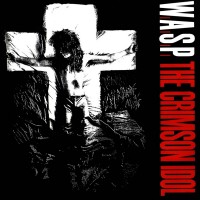      | The Crimson Idol (1992) Not every band achieves something that could be truly called a "magnum opus," and very few have approached the level of intensity, perfectionism, and drama of The Crimson Idol. Nowhere else is Blackie's powerful influence from The Who more evident as this supremely theatrical rock opera weaves its highly emotional tale of fame, corruption, success, and suffering. Utilizing leitmotifs, multilayered sonic assaults, and the most tortured vocals he could muster, Blackie - aided by an expert team including the inimitable Frankie Banali and Bob Kulick - crafted a masterpiece of blistering heavy metal anthems and brooding, impassioned epics. The Crimson Idol is a roller coaster of powerful music and storytelling; if The Headless Children proved that W.A.S.P. were a "real band," The Crimson Idol proved that they could be legends, too. Standout Tracks: "Chainsaw Charlie (Murders In The New Morgue)," "The Invisible Boy," "I Am One," "The Great Misconceptions Of Me" |
| Still Not Black Enough (1995) Like The Crimson Idol, Still Not Black Enough was essentially a Blackie Lawless solo album press-ganged into becoming a W.A.S.P. release; also like The Crimson Idol, it marked a serious departure from anything the band had ever done before, growing still darker, heavier, and more sinister. Dark emotions run deep throughout, but where The Crimson Idol chronicled a fictional character, Still Not Black Enough channels the grief, frustration, anger, and despair of a beaten and weary Blackie Lawless. Musically, it is less extravagant, not so much a blockbuster production as a raw statement of furious heavy metal. Even "Rock And Roll To Death," exactly as silly as it sounds on the surface, rages a lot harder than the old glam days; while the quality of songwriting does not hold up quite as well to the two previous albums, its attitude and heaviness certainly do. Standout Tracks: "Scared To Death," "Breathe," "Still Not Black Enough," "Goodbye America" | 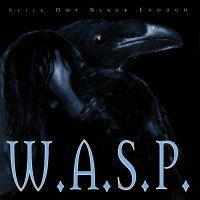     |
     | Kill, Fuck, Die (1997) Original guitarist Chris Holmes made a surprise return to the band for this album, but W.A.S.P. had no intention of regressing to their earlier style; in fact, quite the opposite. Once more fueled by unadulterated rage, Kill, Fuck, Die is a ragged and vicious album with intense industrial influence. The pounding assembly line drums and distorted-to-oblivion guitars, laid out under Blackie's increasingly-agonized screams, create a new jungle of unexplored heaviness. Despite the gruesome appeal of this punkish mechanization, it becomes apparent that Blackie Lawless only knows how to write a few different types of songs. He can dress them up in many different ways, but the well only runs so deep; when it dries up is just a matter of listener opinion. Standout Tracks: "Kill Fuck Die," "My Tortured Eyes," "Killahead," "U" |
| Helldorado (1999) While his songwriting and musical attitudes had matured during the '90s, Blackie's increasingly-sinister output continuously alienated legions of old-school W.A.S.P. fans; poor reception and backlash sent him into a crisis of confidence that resulted in a desperate attempt to recreate the "old days," begetting Helldorado. Helldorado is more than a return to W.A.S.P.'s roots, however; in fact, it goes a few steps further into pop territory they hadn't touched even at the height of hair metal's popularity. Blackie threw every stereotype of loud, brash, unadorned hard rock at the wall and built a generic mound of pabulum from what stuck. A decade too late for the sound to have any impact or meaning, and after W.A.S.P. had gone to such lengths to prove themselves as an intelligent, complex entity, Helldorado serves only as an embarrassment to their discography. Standout Tracks: "Helldorado," "Damnation Angels" |   |
     | Unholy Terror (2001) After Helldorado flopped even more spectacularly than its predecessors, Blackie wised up and returned to doing things his own way. While songs like "Who Slayed Baby Jane?" do try to redeem the sound they attempted on Helldorado, the haunting grind of "Charisma" and thoughtful instrumental "Euphoria" signify a return to deeper ventures. Once more Chris Holmes-less, W.A.S.P. shook out the last vestiges of big-haired buffoonery all over again and turned to developing the aggressive sound they would embody for much of their 21st-century work. While Unholy Terror's slightly mismatched nature occasionally works to its detriment, it makes it a great transition album - leaving behind both the glam roots and the experimentation for a more stable, appropriately W.A.S.P. style. Standout Tracks: "Charisma," "Euphoria," "Raven Heart" |
| Dying For The World (2002) By far the most gleefully sadistic album in W.A.S.P.'s whole catalogue, Blackie Lawless describes Dying For The World as "music to kill people to." In the wake of the 9/11 terrorist attacks, W.A.S.P. whipped up a frenzied (and, as one might have guessed, somewhat politically tense) war soundtrack that mixes anguished laments with wicked exhortations to kill. The lyrics are vague enough to not appear juvenile or dated, and the songs can certainly be enjoyed out of context, but the album bristles with a very real kind of anger, the intent of which is clear. Dying For The World is stocked with some of Blackie's best vocal performances and W.A.S.P.'s strongest songwriting in a decade, making it an imperative listen even for those not interested in "real-world response" pieces. Standout Tracks: "My Wicked Heart," "Revengeance," "Hallowed Ground," "Stone Cold Killers" | 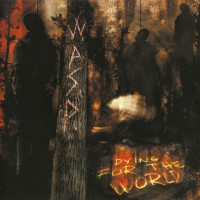      |
      | The Neon God - Part 1: The Rise (2004) When it came time for The Neon God - Part 1, Blackie pretty clearly attempted to recreate The Crimson Idol; fortunately, he did not also attempt to rewrite it. Once more taking cues from The Who's famous rock operas, W.A.S.P. open the album with an overture and thenceforward make liberal use of leitmotifs, short interlude pieces, and some pretty exceptional bass work on the part of Mike Duda. While less extravagant than The Crimson Idol and very obviously intended to parallel it throughout, The Neon God - Part 1 rivals it both thematically and musically, and hosts its fair share of unique songwriting. The utterly ragged "Asylum #9," heart-wrenching "The Raging Storm," and psychedelic "The Red Room Of The Rising Sun" all prove that Blackie can still create works of art. Standout Tracks: "Asylum #9," "The Raging Storm," "Sister Sadie (And The Black Habits)," "What I'll Never Find" |
| The Neon God - Part 2: The Demise (2004) Where The Neon God - Part 1 brought W.A.S.P. unadulterated success, Part 2: The Demise dropped the ball. It takes a wholly different approach to the story, dispensing with the embellishments for a stripped down and straightforward heavy metal album; having such a radically different second half to the story doesn't entirely make sense, and Part 2 suffers from the comparison. It is easily one of W.A.S.P.'s heaviest albums, but without the dramatic power or musical intrigue of the first half of the Neon God saga, this installment feels very much out-of-place. It's possible that Part 2's poor reputation stems partly from its juxtaposition to Part 1, but in a two-part concept album, there's no escaping that. Standout Tracks: "Clockwork Mary," "Never Say Die," "Come Back To Black" |     |
     | Dominator (2007) Dominator carries on the powerful crunch implemented on The Neon God - Part 2, but stylistically returns to a more "regular" W.A.S.P. sound. The seven-minute (ten-and-a-half, counting the reprise) "Heaven's Hung In Black," another heartfelt triumph of Blackie's emotional side, seems to swallow much of the album, but otherwise Dominator is populated by more conventionally-wrought heavy metal cuts that would not sound out-of-place on most W.A.S.P. albums. The album runs very smoothly, confidently, and consistently, with nothing unexpected or off-putting to be found - in other words, a thoroughly solid W.A.S.P. album. Standout Tracks: "Heaven's Hung In Black," "Mercy," "Take Me Up" |
| Babylon (2009) The phrase "resting on their laurels" would typically suggest something negative about the quality of this album, but in the case of Babylon, it refers merely to the fact that, after the success of Dominator, this older, wiser W.A.S.P. no longer feel the need to explore uncharted territory and radically change their sound. Though "Babylon's Burning" is perhaps the only track that sounds unmistakably W.A.S.P., the unmitigated hard rock/heavy metal sound of Babylon plays right to the band's strengths without sounding like an attempted re-write of a previous album, even differing sufficiently from Dominator to stand as its own entity. Babylon wields the simplicity of early W.A.S.P. with the bite and intelligence of later W.A.S.P., and while they may yet search for other sonic avenues in the future, they could easily meet success continuing in this vein for the foreseeable future. Standout Tracks: "Babylon's Burning," "Into The Fire," "Godless Run" | 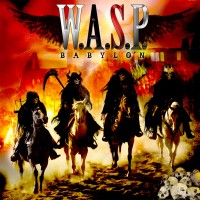     |
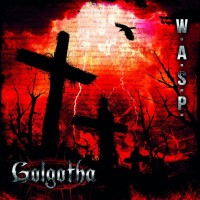     | Golgotha (2015) Six years passed between Babylon and Golgotha - twice as long as any previous gap between W.A.S.P. albums - and yet the resulting album is not all that different from what preceded it. Golgotha follows Dominator and Babylon in their modern reinterpretation of an old-school W.A.S.P. flavor: a little older than last time, a little heavier, a little more sober, but ultimately the same galloping riffs and howl-along choruses. Golgotha does suffer less from filler, having a stronger sound and more consistent writing than Babylon, though the most noticeable shift in priorities has to do with Blackie's rediscovered Christian faith. Having already covered his reconversion in some detail on prior releases, particularly Babylon, Blackie gives more explicit and direct voice to his religious convictions - almost to the point that W.A.S.P. could be assigned the ambiguous "Christian metal" label, perhaps to the confusion of fans not so inclined. Standout Tracks: "Miss You," "Slaves Of The New World Order," "The Last Runaway" |
| ReIdolized (The Soundtrack To The Crimson Idol) (2018) ReIdolized offers a little more than a standard rerecording, incorporating several "new" tracks that were written for the original Crimson Idol and ultimately dropped (as well as a 50-minute film that recreates the album's story). The new tracks fit well into the fabric of the album, although they do reiterate lyrical and musical themes already explored to a comfortable extent on the album as it was released, so it is clear why they were omitted; ironically, it is "Miss You," originally released on Golgotha and also rerecorded here, that makes for a surprising new highlight. While the arrangements of the old tracks are essentially the same (barring some instances of lyrical self-censorship), the performances do have a heavier, moodier character. The modern lineup of W.A.S.P. stands up to the musicianship of the original lineup, especially the powerful drumming; Blackie's voice aged well, delivering his lines with a deeper, thicker, and more morose tone that still allows for natural high notes, though he does seem to lack energy from time to time. Fans of W.A.S.P. may find this version worth investigating, though for newcomers the original should be the first stop. | 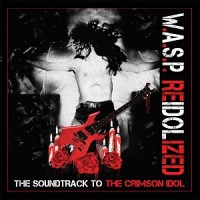     |
--
Overview
From The Headless Children on, W.A.S.P. have made a name for themselves not just in the scene from which they originated, but in the world of heavy metal as a whole. They have wavered and wandered, releasing material in multiple spectrums to various degrees of success, but Blackie Lawless's vision and an exceptional roster of musicians have kept them from collapsing under pressure or falling into obscurity over the decades. With every pitfall offset by a masterpiece, W.A.S.P. have fulfilled their old wish to become a well-respected musical entity, carving their signature sound into the minds of new generations whether reinventing themselves again or revisiting classic techniques.
 | Written on 19.06.2015 by I'm the reviewer, and that means my opinion is correct. |
Comments
Comments: 19
Visited by: 177 users
| musclassia Staff |
| ScreamingSteelUS Editor-in-Chief Admin |
| slim pickings Account deleted |
| Maco Pvt Funderground |
| TheMAGAmvm Soycrusher |
| Bad English Tage Westerlund |
| ScreamingSteelUS Editor-in-Chief Admin |
| ScreamingSteelUS Editor-in-Chief Admin |
| Doc G. Full Grown Hoser Staff |
| TheMAGAmvm Soycrusher |
| FelixtheMetalcat |
| Bad English Tage Westerlund |
| Timelord |
| Warman Erotic Stains |
| Guib Thrash Talker |
| ScreamingSteelUS Editor-in-Chief Admin |
| Bad English Tage Westerlund |
| ScreamingSteelUS Editor-in-Chief Admin |
| JoHn Doe |
Hits total: 20298 | This month: 42








 do we have it?
do we have it?

